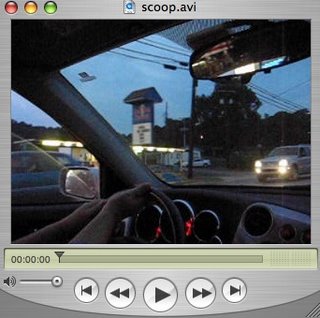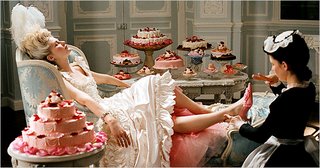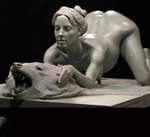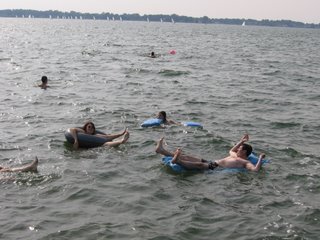A Discovery of Witches
-
I got a new job with a much longer commute, so naturally the first thing I
did was get an Audible account. First I listed to *Olive Again*, by
Elizabeth S...
5 years ago
 Sign this petition for safer practices in Glacier National Park.
Sign this petition for safer practices in Glacier National Park.

 Yesterday C. and I hit a few galleries in Santa Monica and Venice beach. The first place we went to was the Rosamund Felsen Gallery in the Bergamot Station Arts Center, which has about 30 galleries. Rosamund Felsen is showing Kaz Oshiro and Dan Douke through December 30 - they're two trompe l’oeil artists whose work appears, respectively, as Toyota tailgates and cardboard boxes. The level of craftsmanship is so suburb that we went into the gallery and then had to march right back out to the snooty receptionist for more info on what we were looking at. Everything is acrylic on canvas, we were informed with a raised eyebrow. This type of work, sure, it's interesting, and you go in and you go, "Yup, that looks just like a cardboard box." And then what? In a way, today, it's practically reprehensible.
Yesterday C. and I hit a few galleries in Santa Monica and Venice beach. The first place we went to was the Rosamund Felsen Gallery in the Bergamot Station Arts Center, which has about 30 galleries. Rosamund Felsen is showing Kaz Oshiro and Dan Douke through December 30 - they're two trompe l’oeil artists whose work appears, respectively, as Toyota tailgates and cardboard boxes. The level of craftsmanship is so suburb that we went into the gallery and then had to march right back out to the snooty receptionist for more info on what we were looking at. Everything is acrylic on canvas, we were informed with a raised eyebrow. This type of work, sure, it's interesting, and you go in and you go, "Yup, that looks just like a cardboard box." And then what? In a way, today, it's practically reprehensible.  I mean, in terms of representation, the contemporary painter's got to deal with certain challenges - where is the place of representational painting after photographs (not to mention Foucault - har har har), for example? So, you have Chuck Close, or other artists completely avoiding the representational completely. And then these trompe l'oeil artists essentially just showing off... What do they bring us that's NEW? I ask. (: Well, this is not my area, so there may be some major disagreement with my pov. Oh, btw, there was this big piece of plywood leaning against the wall, and as we were getting ready to leave I was grousing about how it didn't really fit in, but then it hit me, it was tromp l'oeil too. Arg!
I mean, in terms of representation, the contemporary painter's got to deal with certain challenges - where is the place of representational painting after photographs (not to mention Foucault - har har har), for example? So, you have Chuck Close, or other artists completely avoiding the representational completely. And then these trompe l'oeil artists essentially just showing off... What do they bring us that's NEW? I ask. (: Well, this is not my area, so there may be some major disagreement with my pov. Oh, btw, there was this big piece of plywood leaning against the wall, and as we were getting ready to leave I was grousing about how it didn't really fit in, but then it hit me, it was tromp l'oeil too. Arg!  Another show we saw was Gajin Fujita at the LA Louver. I thought his work was really fresh and funny. A great mix of traditional Edo-style Japanese art and street graffiti. Really beautiful work.
Another show we saw was Gajin Fujita at the LA Louver. I thought his work was really fresh and funny. A great mix of traditional Edo-style Japanese art and street graffiti. Really beautiful work. Over the weekend C. and I saw The Holiday with Cameron Diaz and Kate Winslet. I was afraid it was going to be awful because it's written and directed by schlockmeister Nancy Meyer (Something's Gotta Give? Yes, it does!), but, actually, as I reference imdb.com, I see that she's also done several movies that I like, such as 1987's Baby Boom and 1984's Irreconcilable Differences. Ok, I havne't seen Irreconcilable Differences since I was 8, but back then, that was a film full of nuance.
Over the weekend C. and I saw The Holiday with Cameron Diaz and Kate Winslet. I was afraid it was going to be awful because it's written and directed by schlockmeister Nancy Meyer (Something's Gotta Give? Yes, it does!), but, actually, as I reference imdb.com, I see that she's also done several movies that I like, such as 1987's Baby Boom and 1984's Irreconcilable Differences. Ok, I havne't seen Irreconcilable Differences since I was 8, but back then, that was a film full of nuance.  composer/love interest of Winslet. I love the scene where he walks through a rental shop, picking up movies and singing their theme songs. It was like I was transported back to High Fidelity (just the good parts.) ITEM! Jack Black is totally hot in this movie.
composer/love interest of Winslet. I love the scene where he walks through a rental shop, picking up movies and singing their theme songs. It was like I was transported back to High Fidelity (just the good parts.) ITEM! Jack Black is totally hot in this movie.

 So, this weekend, M. and I went to Target to do some Christmas shopping, and we're not in the store 5 minutes when someone took our cart, which, by the way, had about 3 or 4 items in it, and we were only about 20 feet away from the cart corral. So, M. grabs another cart and we shop, shop, shop, and we're in the home stretch. We're looking at an item for my brother (wow, I could totally tell you what it is because he's probably like, never read my blog. Ok - it's a headlight flashlight! Don't tell him!) and we turn around, and our cart is gone AGAIN! And we're like, WTF!?! And, I'm telling you, there's a fair amount of stuff in it now. So, we're standing there, all, you know, agog, and then I'm like, IT'S ON! And I say, loudly, "People! Who took our cart!?" and this employee was really nice and helped me look for it, although, when he asked me what was in it, all I could say was, "I don't know. Just a bunch of stuff." So we're walking around looking suspiciously in everyone's carts. Just after I gave up, I see our cart, not far from where we left it, although some of the stuff is gone. So, M. and I reclaim it, and then we see a little pile of the rest of the stuff, laying at the bottom of a shelf.
So, this weekend, M. and I went to Target to do some Christmas shopping, and we're not in the store 5 minutes when someone took our cart, which, by the way, had about 3 or 4 items in it, and we were only about 20 feet away from the cart corral. So, M. grabs another cart and we shop, shop, shop, and we're in the home stretch. We're looking at an item for my brother (wow, I could totally tell you what it is because he's probably like, never read my blog. Ok - it's a headlight flashlight! Don't tell him!) and we turn around, and our cart is gone AGAIN! And we're like, WTF!?! And, I'm telling you, there's a fair amount of stuff in it now. So, we're standing there, all, you know, agog, and then I'm like, IT'S ON! And I say, loudly, "People! Who took our cart!?" and this employee was really nice and helped me look for it, although, when he asked me what was in it, all I could say was, "I don't know. Just a bunch of stuff." So we're walking around looking suspiciously in everyone's carts. Just after I gave up, I see our cart, not far from where we left it, although some of the stuff is gone. So, M. and I reclaim it, and then we see a little pile of the rest of the stuff, laying at the bottom of a shelf. 




 placement go-between, btw) and what happens but HE looks terribly hot too! I haven't thought Rob Lowe was hot since 1985 - St. Elmo's Fire. So, I've been playing an agonizing game of Who Would You Do with myself. I mean... well, who would you do?
placement go-between, btw) and what happens but HE looks terribly hot too! I haven't thought Rob Lowe was hot since 1985 - St. Elmo's Fire. So, I've been playing an agonizing game of Who Would You Do with myself. I mean... well, who would you do?


 The opening sequence is really exciting – I'd say along the lines of X2, you know, the one where the lizard-guy runs around the White House and bursts into the Oval Office? That was so hot. Bond chases this guy who's like some kind of Olympian jumper who leap frogs all over a construction site. Later, Bond must win a multi-million dollar game of Texas Hold-em, neatly tying in with our national obsession. Although I found myself wondering, “Now, why must he win this multi-million dollar poker game?” Oh yes, for some reason. It mostly makes sense – not like so many other action movies where directors simply try to distract their audiences with flashy Matrix-style fight sequences. Casino Royale presents Bond at the beginning of his career as a double-oh, and even strives to present a little insight re: his attitude toward the ladies. It's Q-less and therefore less gadgety, but I think all those gadgets are kind of dopey anyway.
The opening sequence is really exciting – I'd say along the lines of X2, you know, the one where the lizard-guy runs around the White House and bursts into the Oval Office? That was so hot. Bond chases this guy who's like some kind of Olympian jumper who leap frogs all over a construction site. Later, Bond must win a multi-million dollar game of Texas Hold-em, neatly tying in with our national obsession. Although I found myself wondering, “Now, why must he win this multi-million dollar poker game?” Oh yes, for some reason. It mostly makes sense – not like so many other action movies where directors simply try to distract their audiences with flashy Matrix-style fight sequences. Casino Royale presents Bond at the beginning of his career as a double-oh, and even strives to present a little insight re: his attitude toward the ladies. It's Q-less and therefore less gadgety, but I think all those gadgets are kind of dopey anyway. I think there was a missed opportunity to punch up the classic Bond theme song – I'm thinking something like what U2 did with the Mission Impossible ditty a few years ago. Also the asthmatic villain whose eye bleeds is kind of Boris - when he captured Bond I thought for sure he was going to throw him in a tank full of sharks with friggin' laser beams on their heads.
I think there was a missed opportunity to punch up the classic Bond theme song – I'm thinking something like what U2 did with the Mission Impossible ditty a few years ago. Also the asthmatic villain whose eye bleeds is kind of Boris - when he captured Bond I thought for sure he was going to throw him in a tank full of sharks with friggin' laser beams on their heads.
 OMG! The trailer for Order of the Phoenix is out! That's one of my fave HP books. So, we see Harry about to kiss Cho (did they kiss in the book?) and his hair is really short. I liked it better shaggy. Man, I hope these poor kids don't end up all Dana Plato one day.
OMG! The trailer for Order of the Phoenix is out! That's one of my fave HP books. So, we see Harry about to kiss Cho (did they kiss in the book?) and his hair is really short. I liked it better shaggy. Man, I hope these poor kids don't end up all Dana Plato one day. 
 M and I just got back from our vacation to Amsterdam, which was so beautiful - we had a wonderful time. We stayed in a really cool hotel, the Eden Rembrandt Square, which is in a great location in the canal belt. Every day we went to museums, like the Rijksmuseum, the van Gogh museum, the Stedelijk, the Frans Hals museum in Haarlem, and to famous houses, like Rembrandthuis, and Anne Frank's house and the Willet-Holthuysen house. I've read Anne Frank's diary about 50 times, so it was very exciting to see her house, although also terribly sad. I never realized it was on such a lovely canal street. There is no furniture anymore, so you have to imagine all the beds, which is difficult to do because it's very small. Anne's room is easily recognizable because the walls still have her magazine pictures pasted on.
M and I just got back from our vacation to Amsterdam, which was so beautiful - we had a wonderful time. We stayed in a really cool hotel, the Eden Rembrandt Square, which is in a great location in the canal belt. Every day we went to museums, like the Rijksmuseum, the van Gogh museum, the Stedelijk, the Frans Hals museum in Haarlem, and to famous houses, like Rembrandthuis, and Anne Frank's house and the Willet-Holthuysen house. I've read Anne Frank's diary about 50 times, so it was very exciting to see her house, although also terribly sad. I never realized it was on such a lovely canal street. There is no furniture anymore, so you have to imagine all the beds, which is difficult to do because it's very small. Anne's room is easily recognizable because the walls still have her magazine pictures pasted on.


* Two old gins, please!
Most people are other people. Their thoughts are someone else's opinions, their lives a mimicry, their passions a quotation.I just looked it up, and found this longer bit, although I'm not sure of the citation:
People...go through their lives in a sort of coarse comfort, like petted animals, without ever realizing that they are probably thinking other people's thoughts, living by other people's standards, wearing practically what one may call other people's second-hand clothes, and never being themselves for a single moment. ...Most people are other people. Their thoughts are someone else's opinions, their lives a mimicry, their passions a quotation.
Dove in the Arch by Robert Desnos
Cursed!
be the father of the bride
of the blacksmith who forged the iron for the axe
with which the woodsman hacked down the oak
from which the bed was carved
in which was conceived the great-grandfather
of the man who was driving the carriage
in which your mother met your father.
 This weekend was our annual Halloween Party - M. and I decided to make it a theme party: Your Greatest Fear! And people were supposed to dress as their worst fear, uh, embodied. It lead to a lot of existentialism amongst our nerdiest friends and questions along the line of "isn't that which we fear the most our very selves?" and crap like that. ha. I had, since the inception of the theme, decided to dress as a homeless person, which was much less funny after getting the news that I did not get my dream job like, the day before.
This weekend was our annual Halloween Party - M. and I decided to make it a theme party: Your Greatest Fear! And people were supposed to dress as their worst fear, uh, embodied. It lead to a lot of existentialism amongst our nerdiest friends and questions along the line of "isn't that which we fear the most our very selves?" and crap like that. ha. I had, since the inception of the theme, decided to dress as a homeless person, which was much less funny after getting the news that I did not get my dream job like, the day before.  Then I was in kind of a bind because I didn't have another costume idea, and dressing as an out-of-work, somewhat highly educated person was less my greatest fear than my uh, reality. For a brief time I thought I would go as a bunny, in a weird homage to Buffy the Vampire Slayer's Anya, but I was afraid no one would get it and it would be stupid. Do you know I showed an episode of
Then I was in kind of a bind because I didn't have another costume idea, and dressing as an out-of-work, somewhat highly educated person was less my greatest fear than my uh, reality. For a brief time I thought I would go as a bunny, in a weird homage to Buffy the Vampire Slayer's Anya, but I was afraid no one would get it and it would be stupid. Do you know I showed an episode of  Buffy to the class I taught this summer, and no one (NO ONE) had even heard of it. In the end it seemed easier to stick with my original idea than spend the night saying, "No, it's an homage." Anyway, I went as a homeless person after all, and it wasn't too bad. One of the best costumes was by my friend, J., who was a clown; she really terrified people, just by smiling at them. I'm not afraid of clowns, so I just thought she looked cute. D. was a great car salesman.
Buffy to the class I taught this summer, and no one (NO ONE) had even heard of it. In the end it seemed easier to stick with my original idea than spend the night saying, "No, it's an homage." Anyway, I went as a homeless person after all, and it wasn't too bad. One of the best costumes was by my friend, J., who was a clown; she really terrified people, just by smiling at them. I'm not afraid of clowns, so I just thought she looked cute. D. was a great car salesman.
 I'm only recently becoming hip to the Big Lebowsky references - I don't know why it's taken me a while, because that's like, one of my favorite movies - so last week I just about fell off the couch when they started hitting that kid and yelling, "You're entering a world of pain, Larry!" and tonight, oh, it took me a minute, but then I got it... "Hey, I've got a beverage here"???? Come ON! (imagine Gob saying "come on" - you know what I'm talking about...)
I'm only recently becoming hip to the Big Lebowsky references - I don't know why it's taken me a while, because that's like, one of my favorite movies - so last week I just about fell off the couch when they started hitting that kid and yelling, "You're entering a world of pain, Larry!" and tonight, oh, it took me a minute, but then I got it... "Hey, I've got a beverage here"???? Come ON! (imagine Gob saying "come on" - you know what I'm talking about...) 
 (Still calling for her head, aren't they?) Frankly I was relieved that the film didn't include the miserable final years of the royal family's lives (not just because I have a no-death-penalty-rule that I employ, and I couldn't quite decide if it might apply in the case of Marie Antoinette), but because the ending, while avoiding the shedding of blood, perhaps even more convincingly implies that the era was over, but also illustrates the grace and bravery with which Marie Antoinette faced the end of her reign.
(Still calling for her head, aren't they?) Frankly I was relieved that the film didn't include the miserable final years of the royal family's lives (not just because I have a no-death-penalty-rule that I employ, and I couldn't quite decide if it might apply in the case of Marie Antoinette), but because the ending, while avoiding the shedding of blood, perhaps even more convincingly implies that the era was over, but also illustrates the grace and bravery with which Marie Antoinette faced the end of her reign.  What a night. I dressed up like Heidi Klum, by which I mean I wore a blonde wig. And no one knew who I was. I really thought Uli vas going to vin this. Her dresses at Olympus were so fabulous! Listen, I don't care what the guys at Project Rungay have to say, I'm pissed! Oh, puh-lease! (Bitch!): It's about the process and the people in the process. Jeffrey wouldn't have been our pick, but we have no problem with the decision, if for no other reason than it's practically a certainty that all of the final four will be moving to new phases in their careers within the next year. No one knows better than those guys that it's about snarkiness. And no one makes me feel as snarky as Jeffrey. The next phase in Jeffrey's career is crashing a Saturn Sky Roadster.
What a night. I dressed up like Heidi Klum, by which I mean I wore a blonde wig. And no one knew who I was. I really thought Uli vas going to vin this. Her dresses at Olympus were so fabulous! Listen, I don't care what the guys at Project Rungay have to say, I'm pissed! Oh, puh-lease! (Bitch!): It's about the process and the people in the process. Jeffrey wouldn't have been our pick, but we have no problem with the decision, if for no other reason than it's practically a certainty that all of the final four will be moving to new phases in their careers within the next year. No one knows better than those guys that it's about snarkiness. And no one makes me feel as snarky as Jeffrey. The next phase in Jeffrey's career is crashing a Saturn Sky Roadster. 





 Just finished watching PR, and now must spend a whole week in agony, wondering what will happen next! Naturally, I'm inclined to think the worst of Tattoo-Neck Jeffrey, both rude and weak of chin (a definite sign of poor character.) So, Tim leaves us hanging at the end by saying, "blah blah blah UNfortunately..." and then they show Jeffrey crying. I'm sure it's all a smoke screen - probably will go something like, "blah blah blah, UNfortunately poor Jeffrey was unjustly accused blah blah blah" and then he weeps for joy. The reason I think this, of course, is because, as everyone knows, all four of them showed at Olympus Fashion week about a month ago, and the pics are available online for all to see (loyal as I am to Michael, I have to say Uli really rocked it.)
Just finished watching PR, and now must spend a whole week in agony, wondering what will happen next! Naturally, I'm inclined to think the worst of Tattoo-Neck Jeffrey, both rude and weak of chin (a definite sign of poor character.) So, Tim leaves us hanging at the end by saying, "blah blah blah UNfortunately..." and then they show Jeffrey crying. I'm sure it's all a smoke screen - probably will go something like, "blah blah blah, UNfortunately poor Jeffrey was unjustly accused blah blah blah" and then he weeps for joy. The reason I think this, of course, is because, as everyone knows, all four of them showed at Olympus Fashion week about a month ago, and the pics are available online for all to see (loyal as I am to Michael, I have to say Uli really rocked it.)


 Last weekend, M and I went to Wisconsin to celebrate our 8th anniversary - because, when you think of romance, you think of Wisconsin. We stayed at a great B&B recommended by DeBrodian Perruque and sweetkealoha. It was awesome, and the kind proprietress served a hell of a breakfast. Another couple was
Last weekend, M and I went to Wisconsin to celebrate our 8th anniversary - because, when you think of romance, you think of Wisconsin. We stayed at a great B&B recommended by DeBrodian Perruque and sweetkealoha. It was awesome, and the kind proprietress served a hell of a breakfast. Another couple was  staying there - they were farmers from the area and couldn't imagine what we city folk were doing up there, and kept asking us, "What are you city folk doin' way up here?" and "Do you feel safe leaving your house in Chicago?" and "Is life just real, like they say... fast paced down there?" Oh, yes indeedelee-doo, mister, we walk out the door and it's like Blade Runner mixed with the NYSE.
staying there - they were farmers from the area and couldn't imagine what we city folk were doing up there, and kept asking us, "What are you city folk doin' way up here?" and "Do you feel safe leaving your house in Chicago?" and "Is life just real, like they say... fast paced down there?" Oh, yes indeedelee-doo, mister, we walk out the door and it's like Blade Runner mixed with the NYSE.  THEN, when I was riding home on the train - I did something I've been dying to do ever since I read an article about it a long time ago. It's called "jacking in", and what you do is ya take the jack out of your mp3 player, and you expose (sounds dirty, doesn't it?) the hole to someone else with an mp3 player, and then you kind of raise your eyebrows at them, and then they take their ear jack and plug it in to your player and then you plug your thingy into their mp3 player, then you listen to their music for a minute and they listen to yours, and then you switch back. OMG! It was so awesome! So, there's this pink-haired guy sitting next to me, and it took me all through Nina Simone's Feeling Good to do it, but then at Jose Gonzales I got up the nerve, and I ... exposed my hole... and then... (gee, this sounds so dirty) he put his jack in it... and then we smiled at each other... and then we switched back. He was listening to Johnny Cash. Then he said, "What is that, an ipod?" and I said, "no, it's just a regular mp3 player" and then he said, "It's a pinkpod." Take THAT, urban isolation!
THEN, when I was riding home on the train - I did something I've been dying to do ever since I read an article about it a long time ago. It's called "jacking in", and what you do is ya take the jack out of your mp3 player, and you expose (sounds dirty, doesn't it?) the hole to someone else with an mp3 player, and then you kind of raise your eyebrows at them, and then they take their ear jack and plug it in to your player and then you plug your thingy into their mp3 player, then you listen to their music for a minute and they listen to yours, and then you switch back. OMG! It was so awesome! So, there's this pink-haired guy sitting next to me, and it took me all through Nina Simone's Feeling Good to do it, but then at Jose Gonzales I got up the nerve, and I ... exposed my hole... and then... (gee, this sounds so dirty) he put his jack in it... and then we smiled at each other... and then we switched back. He was listening to Johnny Cash. Then he said, "What is that, an ipod?" and I said, "no, it's just a regular mp3 player" and then he said, "It's a pinkpod." Take THAT, urban isolation!

 Well, it turns out that John Mayer and Jessica Simpson are NOT dating, at least according to various sources. JS herself claimed (on the View, I think) that it was all fabricated by the tabs, but the tabs say she started it, and some (US Weekly, maybe?) reports that John broke up with her when she started exploiting their "relationship." Anywho, that's my celeb (non)story of the day. Except to say that Britney Spears had her 2nd child today!
Well, it turns out that John Mayer and Jessica Simpson are NOT dating, at least according to various sources. JS herself claimed (on the View, I think) that it was all fabricated by the tabs, but the tabs say she started it, and some (US Weekly, maybe?) reports that John broke up with her when she started exploiting their "relationship." Anywho, that's my celeb (non)story of the day. Except to say that Britney Spears had her 2nd child today!
